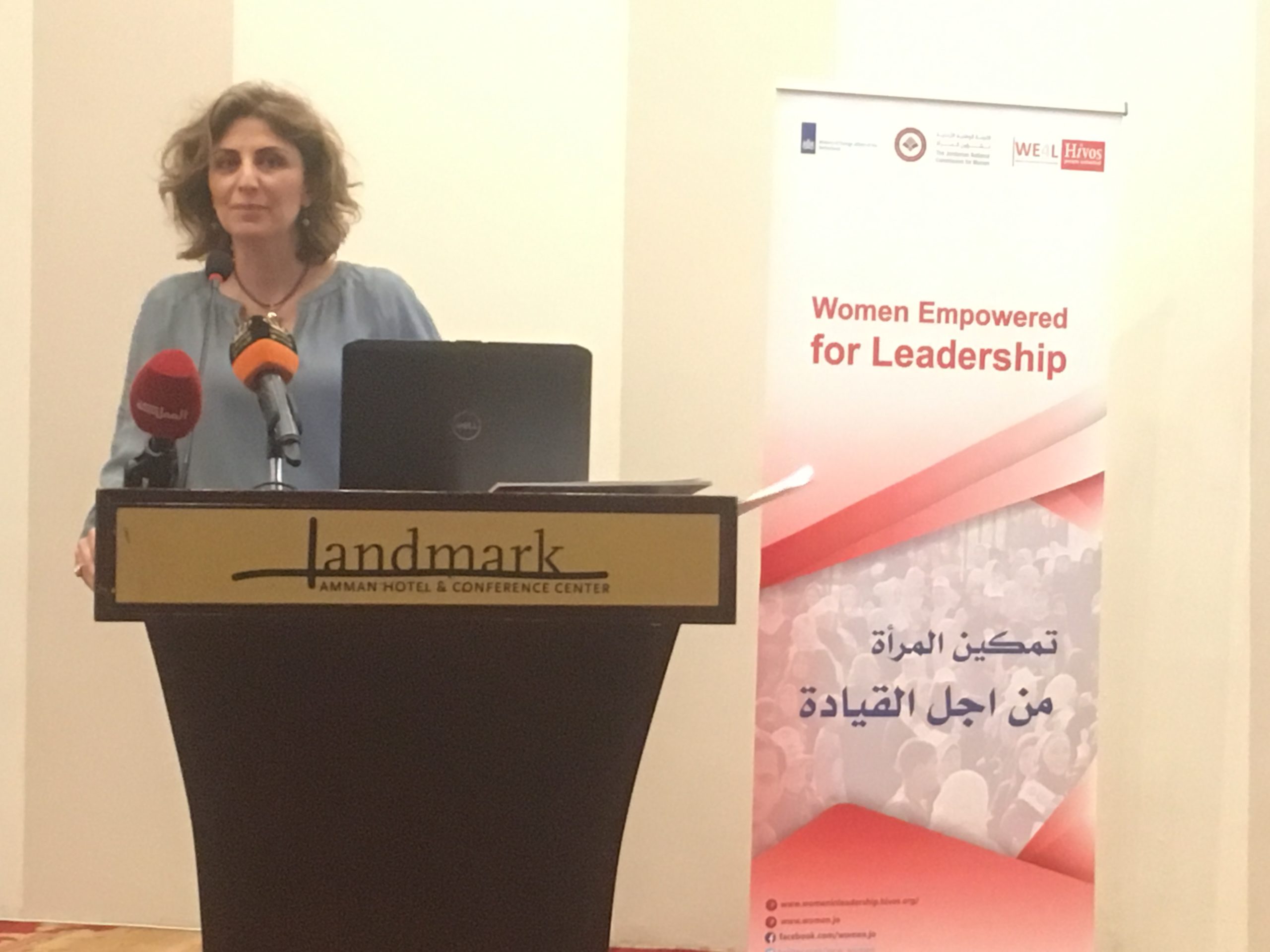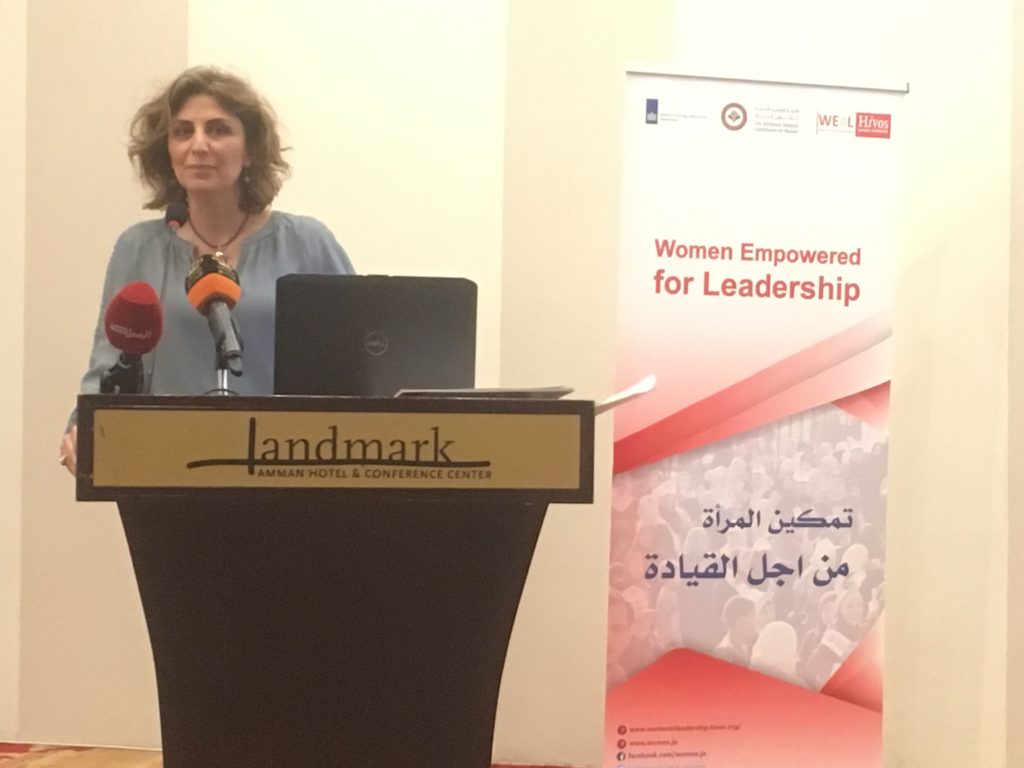id=”818″ id=”post-2422″ class=”wp-post-content-block ” itemscope itemtype=”http://schema.org/BlogPosting” itemprop=”blogPost”>
Covid-19 exposes Jordan’s gender-related flaws
An Interview with Salma Al Nims, Secretary-General of the Jordanian National Committee for Women
By Emily Rohof
Salma Al Nims, Secretary-General of Hivos partner the Jordanian National Committee for Women (JNCW), explains how Covid-19 has impacted women’s lives; how JNCW, civil society and the government aim to have a gender responsive approach to solutions; and how she personally deals with the lockdown. Her view is that women’s needs have not been changed under Covid-19, but the health crisis has exposed the gendered flaws in the social protection system.
Less access of Women to Government’s Support Packages
Concerning the support packages that the government distributes amongst poor people, Al Nims identified three issues that affected women. Firstly, especially in the beginning of the lockdown, only workers in the formal sector were recognized by the social protection system. Women who cook at home and sell their food were thus not eligible for support packages. Women organizations advised and informed the government of this situation, making sure that workers in the informal sector can request support as well. A second issue was that the government dispersed groceries, rather than cash, to households in the beginning of the lockdown. However, the government did not take into account women’s needs, such as women hygiene products and contraception. After civil society organizations made government aware about this, authorities started to give cash support so that households could buy products for themselves. This leads to the third issue, since it were the heads of the households – usually the husbands – who received the money, wives had less access to the finances. Therefore, “men sometimes spent a lot from the support for their own needs, such as buying cigarettes. Thus, women’s needs would be the least provided for,” says Al Nims.
Halted Judicial System
According to the Secretary-General of JNCW, the fact that the judiciary was forced to stop working on 11 March, when the lockdown started, impacted divorced women. On the one hand, there are women who aim to legally divorce and are waiting for sharia courts to give them the divorce papers. Until they are legally divorced, they do not receive alimony from their husbands and cannot register at the national aid fund. On the other hand, there are women who never had the wish or need to have their divorce legally recognized by a court, and they did not need to register at the national aid fund. These women had found their own ways of receiving an income on a day to day basis, for example by going to a community center and doing some work. However, since the lockdown started they cannot move and are deprived of an income. While being the head of the household, they cannot register at the national aid fund since they cannot prove they are divorced. Furthermore, women willing to divorce are “stuck in marriages now”, says Al Nims, since courts cannot continue to work. Another, more indirect effect of the halted judicial system are violations in the private sector. Specifically related to female teachers, claims Al Nims, JNCW has documented many infringements, which have been communicated with the Ministry of Labor. For example, some employers forced teachers to take an unpaid leave or resign. Others gave only half of the salaries for the months of February and March, when employees were working full-time.
Domestic Violence and Family Issues
There are no statistics on the rise of domestic violence against women, but Al Nims claims that JNCW and other civil society organizations receive significantly more calls on the related hotline. Before the health crisis, women that are victim of domestic violence depended on their social networks to talk about their situation or to break the cycle. “They would go out when they see the family, go to school or talk to friends”, says Al Nims; but during the lockdown they are “stuck within the house with their perpetrator.” In these situations, access to the internet and technological literacy becomes crucial, claims Al Nims. JNCW aims to make contacting relevant organizations as easy as possible for victims. Al Nims proposes to make one hotline as opposed to the jumble of dozen governmental platforms that exist now. Those calling this phone number would have the options to be put through to the police or to request either shelter or psycho-social support.
JNCW also advised the government to start a media campaign against domestic violence. “Women are trying to find us, they are looking for us on social media”, says Al Nims. Everyone is watching TV and is waiting for press releases. So “if the government would show on TV it does not tolerate and will respond to any domestic violence case, it would give women a sense of support”, so explains Al Nims.
However, the Secretary-General of JNCW suspects the government is afraid of a political backlash and therefore did not make such statements. “When I say something about domestic violence on twitter now, people ask ‘Why are you talking about this in the middle of a health crisis?’ As if I were talking about something that is a luxury,” tells Al Nims.
More than a month ago, JNCW started a media campaign about women “on the frontline”, those who work in vital sectors. Every day the committee posts a story of one of these women. It contains a quote of the women focusing on how the sharing of household tasks between them and their husband has changed now that they are the ones working in the family. Al Nims herself is content with how she and her husband have equally shared the care for their children and the household tasks. Even though, managing her team at JCNW from distance has been difficult, so “when everyone will start to work again, I will take a vacation,” concludes Al Nims.
What seems most important for the near future is that JNCW and other civil society organizations are incorporated in the institutional mechanisms through which the government plans its strategy dealing with Covid-19. Instead of being allowed to give recommendations as external actors after the government has developed its strategy, the government should consider women organizations as essential. It should welcome civil society organizations from the beginning in order to create strategies that are constructive and concede to the needs and demands of society at large, including vulnerable groups.





